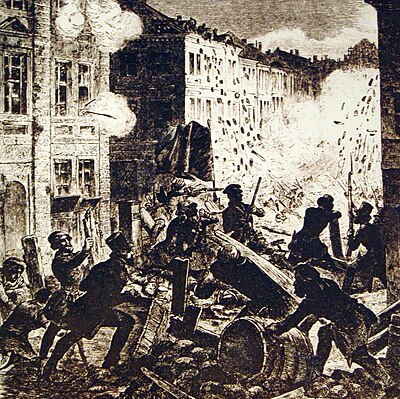On April 23rd Governor Jackson received a secret shipment of artillery that he had requested from Jefferson Davis. He called out the state troops in early May for their annual drill. Lyon believed that this force had been called out to attempt to capture the Federal arsenal, and made plans to capture the force. This may or may not have been their intention. Many Missourians wished to have armed neutrality in the conflict, and some believe this group was a majority of the militia.
 |
| Troops Drilling at Camp Jackson |
Frost, the militia commander, responded saying, "I never for a moment conceived the idea that so illegal and unconstitutional demand, as I have just received from you, would be made by an officer of the United States Army. I am wholly unprepared to defend my command from this unwarranted attack, and shall, therefore, be forced to comply with your demand."2General D. M. Frost, Commanding Camp Jackson.Sir: Your command is regarded as evidently hostile toward the Government of the United States. It is for the most part made up of those Secessionists who have openly avowed their hostility to the General Government, and have been plotting the seizure of its property and the overthrow of its authority. ... These extraordinary preparations plainly indicate none other than the well-known purpose of the Governor of the State, under whose order your are acting, and whose purpose recently communicated to the Legislature, has just been responded to by that body, in the most unparalleled legislation, having in direct view hostilities to the General Government and co-operation with its enemies.
...I do hereby demand of you, an immediate surrender of your command, with no other conditions than that all persons surrendering under this demand shall be humanely and kindly treated.
Believing myself prepared to enforce this demand, one-half hour's time before doing so, will be allowed for your compliance therewith.
Very respectfully, your obedient servant,
N. LYON,Captain Second Infantry, Commanding Troops.1
 |
| Gen. Lyon |
In the aftermath of this conflict while there was no immediate attack on the Federal arsenal, but many of the militia were hardened in their resistance to the Federal invasion of Missouri.
1. The Union Cause in St. Louis in 1861 by Robert J. Rombauer (St. Louis: St. Louis Municipal Centennial Year, 1909) p. 231-232
2. Ibid, p. 232



2 comments:
Does anyone see Lyon as being part of a coup d'etat against the state of Missouri?
Yes it could definitely be seen that way.
Post a Comment